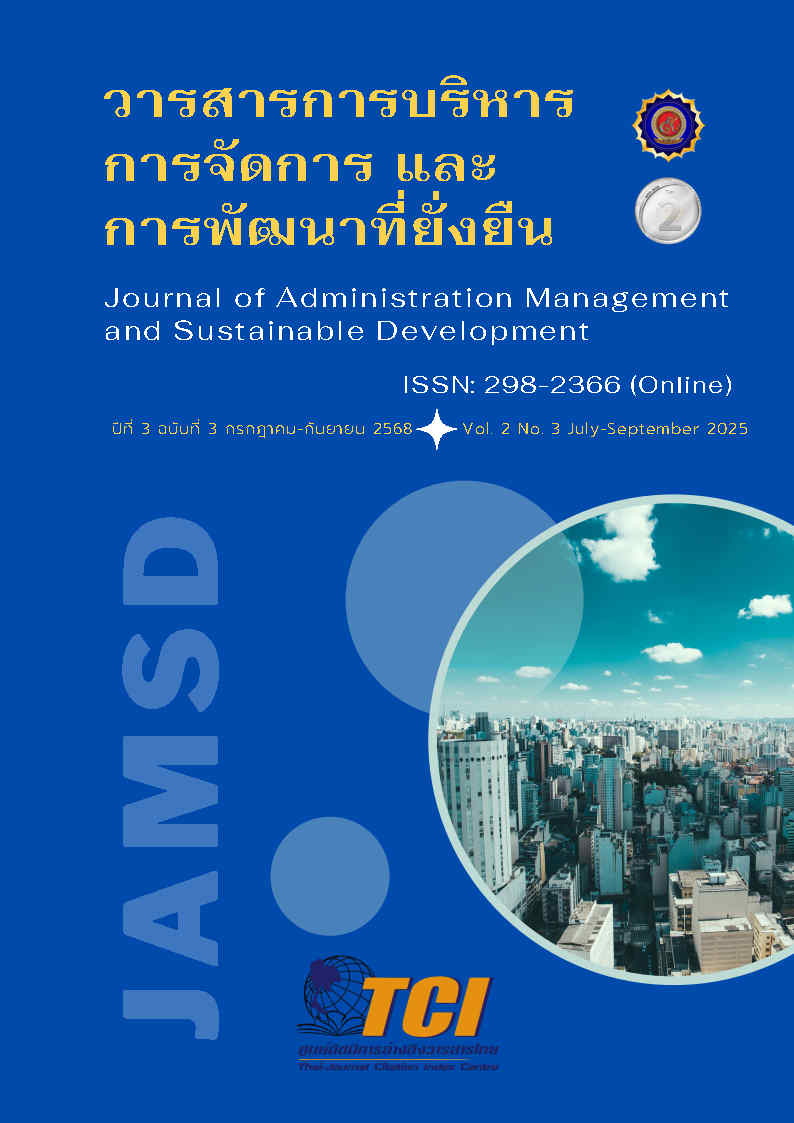Geopolitics: challenges in public administration in the AI era
คำสำคัญ:
geopolitics, public administration, Artificial Intelligence (AI), public policy, governanceบทคัดย่อ
This academic article aims to examine the interplay between AI-driven geopolitical competition and sustainable public administration, proposing a strategic framework to enhance resilience and global competitiveness. It employs a systematic review of interdisciplinary literature on geopolitics and AI governance, supplemented by a SWOT analysis of existing administrative frameworks and comparative case studies of the United States, China, and the European Union. Rapid advancements in artificial intelligence have transformed global policymaking and administrative processes, yet the interplay between AI-driven geopolitical competition and sustainable public administration remains underexplored. We identify five critical factors: big data analytics capability, robust digital infrastructure, specialized human capital, adaptive policymaking, and international collaboration that underpin strategic decision-making, resource allocation, and service delivery. By integrating classical geopolitical theories with contemporary AI applications, our work offers a novel framework addressing emerging ethical, privacy, and cybersecurity challenges. The resulting guidelines provide actionable strategies for public sector leaders to enhance resilience, agility, and global competitiveness.
เอกสารอ้างอิง
Baldwin, R., & Freeman, R. (2021). Risks and global supply chains: What we know and what we need to know (NBER Working Paper No. 29444). National Bureau of Economic Research. https://www.nber.org/papers/w29444.
Barocas, S., & Selbst, A. D. (2016). Big Data’s disparate impact. California Law Review, 104(3), 671–732.
Brzezinski, Z. (1997). The Grand Chessboard: American primacy and its geostrategic imperatives. Basic Books.
Cath, C., Wachter, S., Mittelstadt, B., Taddeo, M., & Floridi, L. (2018). Artificial intelligence and the ‘good society’. Science and Engineering Ethics, 24(2), 505–528.
Ciuriak, D. (2023). The digital revolution has transformed geopolitics. Centre for International Governance Innovation Policy Brief (CIGI Policy Brief No. 19). Centre for International Governance Innovation. https://www.cigionline.org/articles/the-digital-revolution-has-transformed-geopolitics/.
Cox, R. W. (1981). Social forces, states and world orders: Beyond international relations theory. Millennium: Journal of International Studies, 10, 126–155.
Cukier, K., & Mayer-Schönberger, V. (2013). Big data: A revolution that will transform how we live, work, and think. Mariner Books.
Eggers, W. D., Schatsky, D., & Viechnicki, P. (2017). AI-augmented government: Using cognitive technologies to redesign public sector work. Deloitte Insights.
European Commission. (2021). Proposal for a regulation on artificial intelligence (Artificial Intelligence Act): COM(2021) 206 final. EUR-Lex. https://eur-lex.europa.eu/legal-content/EN/TXT/?uri=CELEX:52021PC0206.
Flint, C. (2022). Putting the ‘Geo’ into Geopolitics: A Heuristic Framework and the example of Australian Foreign Policy. GeoJournal, 87, 2577–2592. https://doi.org/10.1007/s10708-021-10387-5.
Floridi, L. (2019). The ethics of artificial intelligence: Principles, challenges, and opportunities. Oxford University Press. Oxford University Press. https://academic.oup.com/book/46748.
Horowitz, M. C. (2018). Artificial intelligence, international competition, and the balance of power. Texas National Security Review, 1(3), 36–57.
IPCC. (2022). Climate Change 2022: Impacts, adaptation and vulnerability. Cambridge University Press.
International Organization for Standardization. (2024). ISO/IEC 42001: Governance of artificial intelligence — Framework. ISO.
Kaplan, R. D. (2012). Asia’s Cauldron: The South China Sea and the end of a stable Pacific. Random House.
Kaplan, R. S., & Norton, D. P. (1996). The balanced scorecard: Translating strategy into action. Harvard Business School Press.
Kissinger, H. A., Schmidt, E., & Huttenlocher, D. (2021). The Age of AI: And our human future. Little, Brown and Company.
Mackinder, H. J. (1904). The geographical pivot of history. The Geographical Journal, 23(4), 421–437.
Mehr, H. (2017). Artificial intelligence for citizen services and government. Harvard Ash Center for Democratic Governance and Innovation.
Nye, J. S. (2011). The future of power. PublicAffairs.
Schwab, K. (2017). The Fourth Industrial Revolution. Currency.
Singer, P. W., & Friedman, A. (2014). Cybersecurity and cyberwar: What everyone needs to know. Oxford University Press.
Till, G. (2013). Seapower: A guide for the twenty-first century (3rd ed.). Routledge.
United Nations Office for Disaster Risk Reduction. (2023). Global assessment report on disaster risk reduction 2023: Mapping resilience for the Sustainable Development Goals. UNDRR. https://www.undrr.org/gar/gar2023-special-report.
United Nations Educational, Scientific and Cultural Organization. (2021). Recommendation on the ethics of artificial intelligence. UNESCO. https://www.unesco.org/en/articles/recommendation-ethics-artificial-intelligence.
West, D. M., & Allen, J. R. (2020). Turning point: Policymaking in the era of artificial intelligence. Brookings Institution Press.
Wright, T. (2018). All measures short of war: The contest for the twenty-first century and the future of American power. Yale University Press.
Zuboff, S. (2019). The Age of Surveillance Capitalism: The fight for a human future at the new frontier of power. PublicAffairs.



